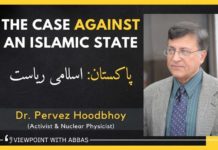The Eqbal Ahmad Centre for Public Education (EACPE) seeks to foster the use of science and reason to understand nature and society and so better enable all citizens of Pakistan to participate fully in the political, social, economic, and cultural life of their society; to exercise their democratic rights and responsibilities; to value human rights, democracy and the rule of law; to promote cultural and religious diversity; to raise awareness of global issues and the natural environment; and to advance the goals of international peace and justice.
EACPE is named to honour the life and work of distinguished Pakistani academic, activist, and public intellectual, Dr. Eqbal Ahmad.
“The EACPE record is very impressive, and hopeful — a rarity these days. About the webpage (design), I don’t have anything useful to say. Have little experience that’s relevant. To me personally, the range and choice of topics is appealing and impressive. I can’t think of any useful way to improve it.”
— Noam
(Received on 5th May, 2017. As a member of the EACPE board, Professor Noam Chomsky was asked to suggest how to improve our main page)









An extract from Imām al-Ghazālī (d. 1111 CE)’s book “Fātihat al-`Ulum” (Cario, 1322), p. 56, available online at:
(http://read.kitabklasik.net/2010/01/fatihat-al-ulum-imam-al-ghazali.html)
“To drink wine for the purpose of strengthening one’s body is undoubtedly beneficial; nevertheless, it is forbidden. The games of ‘maisir’ and chess involve intellectual exercises, and yet no one considers this to be sufficient justification for the pursuit of them. The same applies to the study of the sciences of Euclid, the ‘Almagest’ [al-majisṭī in Arabic original; — a 2nd-century Greek-language mathematical and astronomical treatise on the apparent motions of the stars and planetary paths, written by Claudius Ptolemy] and the subtleties of arithmetic and geometry [daqāiq al hisāb wa l-hindsa wa-r Riyyadha]. These too render the mind more acute and strengthen the soul, and yet we refrain from them for one reason: they are among the presuppositions of the `llm al-awāil and that these latter [i.e. the `ilm al-awāil] include those sciences, beside arithmetic and geometry, that entail the acceptance of dangerous doctrines. Even if geometry and arithmetic do not contain notions that are harmful to religious belief, we nevertheless fear that one might be attracted through them to doctrines that are dangerous.”
(English translation of the extract by Merlin Swartz, “Studies on Islam,” p. 195, New York etc. Oxford University Press, 1981)